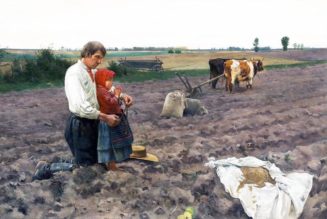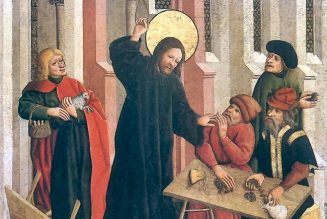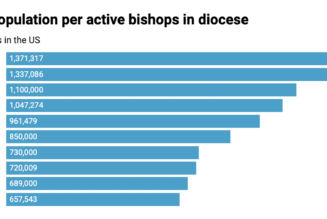
Labor Day makes me mindful of our interconnectedness; we need one another in order to survive. Consider how we are each called to contribute as well as how we benefit from the labor of others:
Even that simple can of corn you pull from the grocery store shelf has thousands of people standing behind it: from those who stock the shelves to the truckers who transport the product to the store; from the regional warehouse workers to the rail operators who supply the warehouse; from the farmers and harvesters to the granary workers. Then there are others such as those who supply fertilizers that aid in growth and those who developed innumerable agricultural technologies over the years. People also labored to build the roads and rails over which the products travel. Others supply fuel for the trucks, combines, and locomotives. Coal miners work hard to supply the electricity needed all along the way. Still others in banking and business take risks and supply the funds to run agricultural, transportation, and food distribution businesses and networks. The list of people who have worked so that you and I can buy that can of corn at the store is almost endless.
Thanks be to God for human labor; we help each other to survive!
As today is Labor Day in the United States, it seems good to reflect on some teachings about human labor from the Catechism of the Catholic Church (CCC). In the list below, the text from the catechism is italicized while my comments appear in plain red text.
1. Human labor precedes Original Sin and hence is not an imposition due to sin but rather part of our original dignity.
God places [Man] in the garden. There he lives “to till it and keep it.” Work is not yet a burden, but rather the collaboration of man and woman with God in perfecting the visible creation (CCC #378).
Note that our dignity is that we are to work with God to perfect creation. Adam and Eve were told by God to fill the earth and subdue it (Gen 1:28). Radical environmentalism often presents a far more negative view of humanity’s interaction with the environment. While we have not always done well in treating the environment, it is wrong to think of the created world as better without humanity’s presence. Rather, it is our dignity to work with God in perfecting nature. Note also the description of work as not burdensome prior to the advent of sin. Man and woman did have work to do, but it was not experienced as a burden. Only after Original Sin did work come to be perceived in this way: Eve would bring forth her children in pain and Adam would only get his food by the “sweat of his brow” (Gen 3:16, 19).
2. Human work is a duty and prolongs the work of creation.
Human work proceeds directly from persons created in the image of God and called to prolong the work of creation by subduing the earth, both with and for one another. Hence work is a duty: “If anyone will not work, let him not eat” [2 Thess 3:10]. Work honors the Creator’s gifts and the talents received from him (CCC #2427).
See again the emphasis on our dignity as collaborators with God in the work of creation and in perfecting what God has begun! Not everyone can work in the same way. Age and handicap may limit a person’s ability to perform manual labor. Further, talents and state in life tend to focus one’s work in specific areas. All, however, are called to work in some way. Even the bedridden can pray and offer their suffering for the good of others.
3. Work can be sanctifying and redemptive.
[Work] can also be redemptive. By enduring the hardship of work in union with Jesus, the carpenter of Nazareth and the one crucified on Calvary, man collaborates in a certain fashion with the Son of God in his redemptive work. He shows himself to be a disciple of Christ by carrying the cross, daily, in the work he is called to accomplish. Work can be a means of sanctification and a way of animating earthly realities with the Spirit of Christ (CCC #2427).
In his mercy God has not forsaken sinful man. The punishments consequent upon sin, “pain in childbearing” and toil “in the sweat of your brow,” also embody remedies that limit the damaging effects of sin (CCC # 1609).
Sin has brought upon us many weaknesses and selfish tendencies. Work can serve as a remedy through which we are strengthened unto discipline, contribution to the common good, and cooperation with others in attaining good ends.
4. Work is an acceptable sacrifice to God.
[The] laity, dedicated as they are to Christ and anointed by the Holy Spirit, are marvelously called and prepared so that even richer fruits of the Spirit maybe produced in them. For all their works, prayers, and apostolic undertakings, family and married life, daily work, relaxation of mind and body, if they are accomplished in the Spirit—indeed even the hardships of life if patiently borne—all these become spiritual sacrifices acceptable to God through Jesus Christ. In the celebration of the Eucharist these may most fittingly be offered to the Father along with the body of the Lord (CCC # 901).
5. To work is to participate in the common good.
Participation [in the common good] is achieved first of all by taking charge of the areas for which one assumes personal responsibility: by the care taken for the education of his family, by conscientious work, and so forth, man participates in the good of others and of society (CCC # 1914).
We work not only to benefit ourselves but also to contribute to the good of others and society in general. We do this first by caring for our own needs to the extent possible, thus not burdening others unnecessarily. We also contribute to the common good by supplying our talent and work in such a way as to contribute to the overall availability of goods and services in the community. We supply our human talent and the fruits of our labor to others, while at the same time purchasing the goods and services of others.
The key word seems to be “dignity.” Human work proceeds from our dignity as collaborators with God in perfecting and completing the work of creation. Everyone can work and should do so in the ways possible for him or her, not merely out of a sense of duty but also because it is the essence of dignity.
To return to our opening theme, here are some lyrics from the song “I Need You to Survive”:
I need you, you need me.
…
It is God’s will that every need be supplied.
You are important to me, I need you to survive.
[embedded content]
Cross-posted at the Catholic Standard: Labor Day Reflection: We Need One Another to Survive








